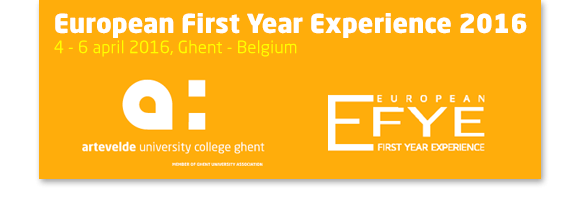Pre-conference sessions
Pre-conference session 1 - A4
The FYE body of work is arguably 117 years old, how up to date are you? - Ed Foster (NTU) and Diane Nutt (international chair EFYE)
In the 1970’s when Vincent Tinto first published his work on student retention, he drew extensively from Van Gennep’s book “The Rites of Passage”. Although Tinto was quoting the 1960 translation, Van Gennep’s book was originally published in 1909. We’ve learnt quite a bit about the first year since then. This workshop is specifically designed for colleagues new to the concept of the first year experience. It will be particularly useful for those seeking to contextualise the papers presented during the conference, or for thinking about submitting a paper to next year’s conference.
We will explore some of the histories of the First Year Experience in the US, Australasia, South Africa and, of course, Europe while looking look at some of the core theories, including:
- Problematising the first year: why is it such a challenge?
- Transition models
- Social and academic transition
- Student engagement
- Widening participation, pathfinder students and strategies for overcoming socio-economic disadvantage
Pre-conference session 2 - L01.07
Learning Gain(ed) – encouraging student led development through partnership and metrics - Luke Millard, Stuart Brand, Alex Gittings, Jamie Morris (Birmingham City University)
Learning gain can be defined as the ‘distance travelled’, or the improvement in knowledge, skills, work-readiness and personal development demonstrated by students at two points in time. This pre-conference workshop will focus on how this concept can be employed to impact upon the development of the first year student experience . We will discuss how we can measure such development, but more importantly, from a student development perspective, how that improvement can be encouraged through effective engagement. We will highlight integrated approaches to welcoming students to university that enable students to identify and address areas of weakness and build upon their strengths. We will showcase work from Birmingham City University and elsewhere and draw on the expertise of the participants to get a better understanding of how students view their own abilities as we seek to discover how first year students can be best encouraged to engage with and lead their own development.
Pre-conference session 3 - L01.11
Using learning analytics to improve student transition into and support throughout the first year - Tinne De Laet, Sarah Lawther, Rebecca Edwards, Maartje van den Bogaard, Jan-Paul van Staalduinen (KU Leuven, Nottingham Trent University, Universiteit Leiden, TU Delft)
"Analytics is a term used in business and science to refer to computational support for capturing digital data to help inform decision-making … Learning Analytics appropriates this concept for education.” (Buckingham Shum, 2012, p.1). Increasingly the sector is exploring how staff can use data to support and guide students or students can use the data to make decisions about their approaches to their own studies. Potentially given the scale of the transition from secondary education to the first year at university, this is highly relevant to delegates.
This workshop will:
• Summarise the issues associated with the growth of learning analytics in higher education. We will look at the ethics, practice and current developments.
• Discuss the how learning analytics can support students in the transition from secondary to higher education. In particular, we will gather useful insights in which data to use, how to gather this data, and how to support the student with this data
• Actively explore strategies for actually integrating learning analytics into institutional working practices. We will explore the issues from the perspective of students, academics, managers or counselors.
Materials: presentation, case 1, case 2 and case 3
Pre-conference session 4 - L01.10
Designing the integrated first year curriculum to promote students’ self efficacy: Applying 3rd generation transition pedagogy. - Matthew Portas (Teesside University)
In this Pre-conference workshop (2 hours) participants will:
- Explore all potential stakeholders in the development of an integrated curriculum
- Design and present their own curriculum using the 3rd generation transition pedagogy approach. Consideration of teaching, learning and assessment will be made.
- See an example existing in practice
- Identify the key barriers to implementation of such an approach in European Higher Education Institutions
